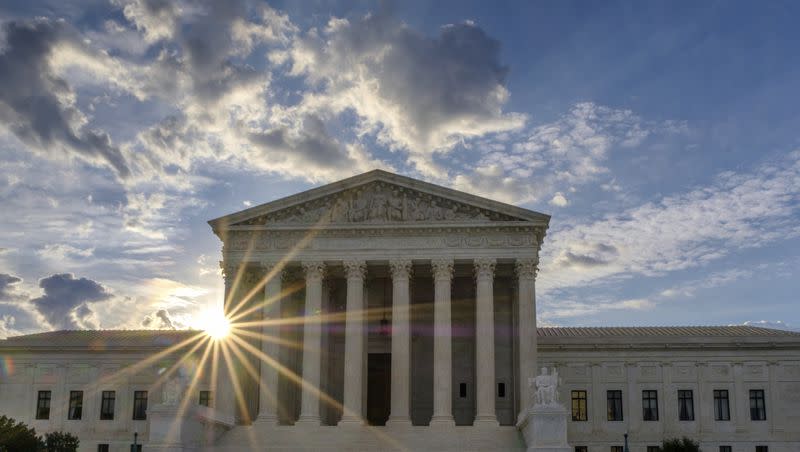Sen. Mike Lee lands on Vivek Ramaswamy’s list of potential nominees for the Supreme Court

- Oops!Something went wrong.Please try again later.
- Oops!Something went wrong.Please try again later.
- Oops!Something went wrong.Please try again later.
Businessman Vivek Ramaswamy, the third most popular candidate in Republican presidential primary polls, unveiled a list of nine potential Supreme Court nominees on Monday. This list includes Sen. Mike Lee, R-Utah, and Sen. Ted Cruz, R-Texas.
Ramaswamy said in a Twitter post that, unlike President Joe Biden, who focused on race and gender diversity, his main criteria were to choose people with “an unwavering commitment to an originalist understanding of the U.S. Constitution” and an understanding of “the unique threats to liberty in the 21st century.”
“Our courts remain the last line of defense against the overreach and weaponization of government,” Ramaswamy said. “As president, I will appoint judges who will protect the integrity of our constitutional Republic.”
Ramaswamy’s conditions for Supreme Court nominees
The list includes individuals with diverse experiences, including the two U.S. senators.
Lee was a clerk for Justice Samuel Alito during Alito’s tenure as a federal appeals judge and later when he became a high court judge.
Ramaswamy noted Lee’s 2022 book, “Saving Nine: The Fight Against the Left’s Audacious Plan to Pack the Supreme Court and Destroy American Liberty,” and called him a known advocate of “originalism in Congress.”
As for Cruz, Ramaswamy said he “fought for the Constitution and against left-radical court-packing,” while also championing religious liberty and winning the 2017 American Legion Religious Liberty Award.
But, he told The Associated Press, he would only appoint Lee or Cruz if it didn’t impact the GOP’s position in the Senate, currently under the control of Democrats.
Related
“My list was not drawn from personal recommendations or backroom deals,” he said, adding that although he hasn’t met most of the individuals he listed, he will meet them over the course of the next year.
Ramaswamy explained that the list took many months to create and used feedback from multiple non-governmental groups. It also underwent an internal review that looked over previous judicial decisions, among other things, and assessed whether they aligned with a commitment to the Constitution.
Ramaswamy’s list shares similarities with Trump’s picks
Another notable potential nominee on the list is 5th U.S. Court of Appeals Judge James Ho, a conservative who authored the lower court’s opinion in Dobbs v. Jackson Women’s Health Organization.
Ho was appointed by former President Donald Trump, who also released his list of possible appointees during the 2016 primaries.
Ramaswamy is the only candidate to share such a list so far in the 2024 race for the presidency.
Names like Lee and 3rd Circuit Judge Thomas Hardiman, nominated by President George W. Bush, appeared on the lists of both Trump and Ramaswamy.
During his presidency, Trump appointed three justices to the bench that ultimately helped solidify a conservative majority.
Related
“It’s important, when you’re asking voters to select the next president of the United States, that you be as transparent as you can about what you’re going to do,” Ramaswamy said.
His other picks included:
Judge Lawrence Van Dyke, serving on the U.S. Court of Appeals for the 9th Circuit. He ruled in favor of the Miss USA Pageant for barring a transgender woman from competing.
Judge Lisa Branch, seated on the 11th Circuit, U.S. Court of Appeals, ruled in favor of Alabama’s voter ID law that requires individuals to present a photo ID when casting a ballot.
Judge Justin Walker, appointed to the D.C. Circuit of the U.S. Court of Appeals, ruled against Mayor Greg Fischer and the city of Louisville for imposing pandemic-related restrictions on a religious institution, the On Fire Christian Center.
6th Circuit Judge John Bush on the U.S. Court of Appeals, who ruled against the Biden administration for enforcing vaccine mandates for workers in Kentucky.
Former U.S. Solicitor General Paul Clement, who won a major guns right case, New York State Rifle and Pistol Association v. Bruen, which ultimately struck down the state’s concealed carry law that required individuals to provide proper cause. He resigned from his firm King & Spalding because they backed out of defending the Defense of Marriage Act, which did not federally recognize same-sex marriages.

